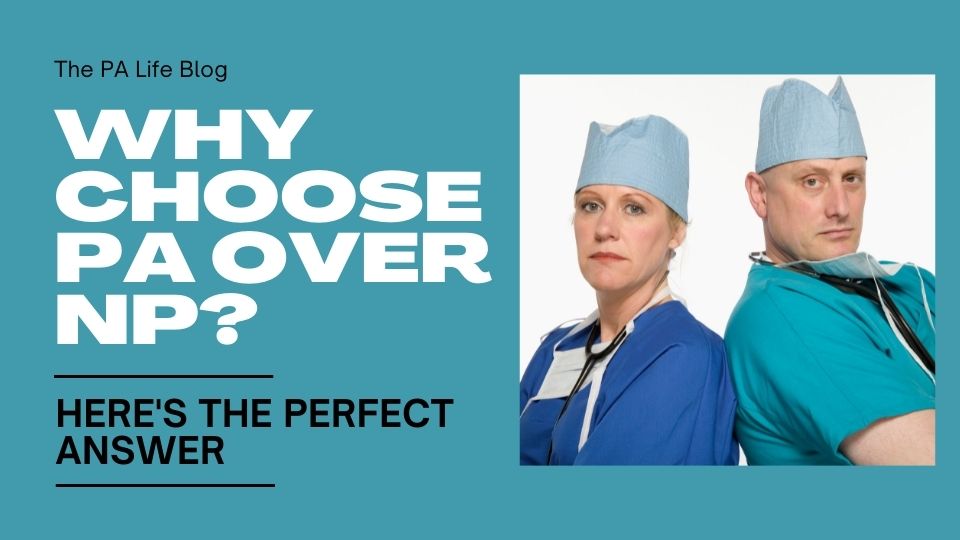
A common PA school interview question that stumps many well-intentioned PA school interviewees is, "Why did you choose PA over NP?"
This is a classic question that you must be prepared to answer.
Do you have an answer?
How to answer the PA vs. NP interview question without being offensive
Here is a clip from one of our recent mock interviews. It provides the perfect foundation on which you can construct your answer to this question.
"I took a pathway in healthcare that has led me to the PA track. It is a natural progression for me. I have a strong biology background, and I love the diagnostic aspect of medicine. The medical model inspires me, and I want to learn from that. I also work with PAs and NPs, and I understand the value of both of them, and I know what great clinicians they both are. But for me, I feel that I don't have that extensive RN training going into this, and I feel like the benefit of the PA training for me is that it offers a broader clinical foundation if I don't have the nursing background to draw from. It will provide me with extra clinical rotations and a more extensive generalist foundation in medicine that I am looking for at this point."
Tips to answering this question like a pro
- Talk about training because that's where PA stands out the most.
- Don't belittle the NP profession or focus too much on the medical versus nursing model. Be diplomatic, as in the example above.
- Remember, working as a nurse is no longer a prerequisite to becoming an NP due to all the direct-entry programs out there. One technically earns an RN during the first year of many accelerated 3-year NP programs and doesn't ever practice as an RN on the way to becoming an NP.
- Avoid overused catchphrases such as lateral mobility or flexibility in practice. Although there may be truth to this, it's not a good place to focus your time and attention.
- Make sure to mention prior experiences you have had with PAs and NPs so that the ADCOMS know that you understand the differences and can make an insightful comparison.
Practice makes perfect
Don't show up for your interview wishing for the best. Practice your answers to this question with a friend or schedule a mock interview to practice answering under pressure.
Bonus: PAs and NPs Similarities and Differences
Source (AAPA 2022)
View all posts in this series
- My PA School Interview: The Journey of a Lifetime
- The Top 46 Physician Assistant Applicant Interview Questions
- Use this Interview Hack to Get The Physician Assistant Job of Your Dreams!
- The Physician Assistant Job or PA School Interview – Email Etiquette
- The Physician Assistant Interview: Thank You and Follow-up (With Sample)
- A Look Inside Two PA School Interviews
- 5 Things I’ve Learned Going Into My Fourth Physician Assistant Application Cycle
- 300 PA School Interview Questions You Should Be Ready to Answer
- PA School Mock Interviews: Prepare with a LIVE, Recorded Video Interview
- Mock Physician Assistant School Interview With Taylor Hill Pre-PA
- Mock PA School Interview With Pre-PA Lily Boyle
- The Interview That Got This Pre-PA Into 5 PA Schools
- 101 PA School Applicants Answer: What’s Your Greatest Strength?
- Mastering Your PA School Interview: Tone Matters
- The Worst PA School Interview Question Ever!
- Why Choose PA Over NP? Here’s the Perfect Answer
- Don’t Make This Critical PA School Interview Mistake!
- 5 Best Ways to Give a Memorable PA School Interview
- 3 Things to Do the Night Before Your PA School Interview
- How to Prepare for Your PA School Interview Day Essay
- How to Squash PA School Interview Day Stress (4 Simple Steps)
- Mind Mapping: A Tool for Personal Statements, Supplemental Essays, and Interviews
- Here’s What a REAL PA School Interview Looks Like (in 2024)
- My PA School Interview Preparation Strategy
- How to Bring Your Best on PA School Interview Day
- How to Cope with PA School Application Rejection
- ChatGPT Answers the Top 46 PA School Applicant Interview Questions
- Why Our Program? How to Answer This Common Supplemental Essay and Interview Question
- What is a PA? How to Nail This Not-So-Easy Interview Question
- How to Answer Behavioral Questions in Your PA School Interview















I looked at the Boston College Direct Entry programmeas well as the Johns Hopkins Direct Entry Programme They are NOT programmes for NPs- once you graduate these programmes you get a Masters Degree and if you pass the NCLEX you become an RN. You do NOT become an NP.
Thank you for pointing out that clarification about the Boston College and Johns Hopkins Direct Entry programs. You’re absolutely correct that these programs are designed to prepare students for licensure as Registered Nurses (RNs) upon passing the NCLEX, rather than for roles as Nurse Practitioners (NPs). The degree conferred is a Master’s, but it does not qualify the graduate to practice as a Nurse Practitioner unless they go on to complete additional specialized education and certification. I appreciate your attention to detail, and it’s an important distinction for prospective students to understand. Thank you for taking the time to share this valuable information.
I know why people would want to be a PA- there are many advantages to this if one doesn’t have the nursing background. What I would like to know is why anyone would want to choose a PA as their PCP. If they want a nursing model they would choose an NP. If they want a medical model they would choose an MD or DO. What advantage does a PA have over a physician?
This is an excellent question!
In almost all circumstances I would expect a consumer to gravitate towards the physician if all options were equal. For example – “Mrs. Smith would you like to see the PA, NP, or MD? They all have openings on the same day and at the same time.” But, more often than not, a patient will choose the provider that fits best into their schedule. If the doctor is two months out and the PA can see you in two days, you are more likely to choose the latter. Also, sometimes follow-up appointments are automatically scheduled with a PA. What happens next is that the PA may see the patient who is very happy with the care that they receive. They may find they actually prefer the care they received to that of the physician. In this case, patients often choose the PA moving forward. This positive association may affect who they choose to see in the future. They may find that they receive more attention and time when they see the PA and choose them again when given the option.
Stephen Pasquini PA-C
I know why people would want to be a PA- there are many advantages to this if one doesn’t have the nursing background. What I would like to know is why anyone would want to choose a PA as their PCP. If they want a nursing model they would choose an NP. If they want a medical model they would choose an MD or DO. What advantage does a PA have over a physician?
I hate to disagree with you, but one does have to work as a nurse even in the direct entry programs- they have to get a job midway through school and clock in so many hours as a nurse before they can graduate as an NP.
Hi Sheila! Thanks so much for sharing your insights.
Here were two options that I found on this website: https://thriveap.com/blog/do-you-need-work-rn-becoming-nurse-practitioner
Are you saying that participants in these programs still have to have a certain number of hours to progress through these programs?
1. Attend an Accelerated NP Program– Some schools offer accelerated or ‘bridge’ programs to prospective NP’s seeking a career change. These programs typically require you to hold a bachelor’s degree in a field other than nursing. The first year (or more) students complete the RN portion of their degree. The second (and possibly third) year of the program students are prepared as nurse practitioners. This means that upon graduating you have an RN degree but will be immediately eligible for employment as a nurse practitioner. You can forgo working as a RN, if you like.
2. Attend Consecutive BSN and Nurse Practitioner Programs- If you can’t find an accelerated NP program to meet your needs, you can create your own personalized path to the NP career allowing you to skip RN employment moving straight to the advanced practice portion of your career. Attend a BSN program applying to a nurse practitioner program the last year of your schooling. Make sure your NP programs of interest do not require any work experience as you will not qualify. If you are accepted to a nurse practitioner program, you will move straight through your nurse practitioner education without a year’s pause to work as an RN.
Thanks!
Stephen Pasquini PA-C
Very interesting. I notice that the names of these so called schools are not provided. I am not even sure that this is legitimate or reputable information. I suggest that you call up the two certifying bodies of NPs- the ANCC or the AANP and ask them. You could even ask your local Board of Registration in Nursing- they would know the requirements as they are the ones issuing the licenses. I can almost guarantee that you will not get the same answer you found.
Actually if you follow links within the website listed, you find colleges that fit the two options listed. As an RN coming into the PA profession I have worked with many NPs who never worked as an RN before sitting for boards. I don’t think it’s the best option, but it happens. John’s Hopkins, and Boston College are just a couple of the schools that offer the first of the two options.